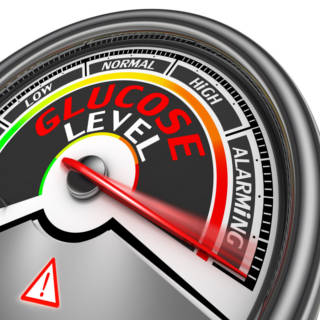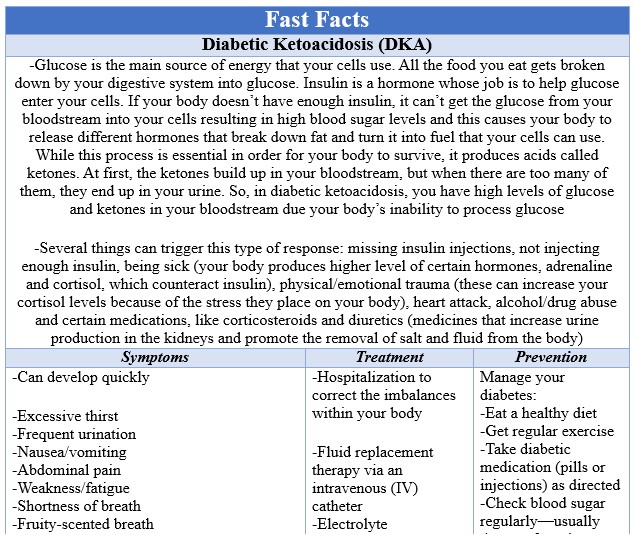Why is your blood sugar so high?
If you have diabetes, you are monitoring your blood sugar frequently. Obviously, if it gets too low, it is a significant problem. It is also a problem if it gets too high. What symptoms do you have if your blood sugar is too high? What should you do? Do you need to go the hospital?
 Definition
Definition
In order to understand what Diabetic Ketoacidosis (DKA) is, we need to look at how your body normally processes glucose (sugar). Glucose is the main source of energy that your cells use. All the food you eat gets broken down by your digestive system into glucose. Insulin is a hormone whose job is to help glucose enter your cells. If your body doesn’t have enough insulin, it can’t get the glucose from your bloodstream into your cells resulting in high blood sugar levels and this causes your body to release different hormones that break down fat and turn it into fuel that your cells can use. While this process is essential in order for your body to survive, it produces acids called ketones. At first, the ketones buildup in your bloodstream, but when there is too many of them, they end up in your urine. So, in diabetic ketoacidosis, you have high levels of glucose and ketones in your bloodstream due your body’s inability to process glucose.
Several things can trigger this type of response. If you are replacing the insulin your body is missing with injections, you can be at great risk of developing DKA, especially if you miss an insulin dose or you aren’t injecting enough insulin. This is why it is essential to follow instructions for dosing your insulin and remember to take it when you are supposed. When you are ill, your body produces higher level of certain hormones, adrenaline and cortisol. Unfortunately, these hormones counteract the effect of insulin. So, if you are diabetic, this can result in an episode of DKA. Some other possible triggers include physical/emotional trauma because your stress levels are raised (causing an increase in cortisol levels), heart attack, alcohol/drug abuse and certain medications, like corticosteroids and diuretics (medicines that increase urine production in the kidneys and promote the removal of salt and fluid from the body). If you have Type I Diabetes or frequently miss doses of insulin, you are at increased risk of having a DKA episode.
DKA symptoms can develop quickly—in some cases, they can develop within a 24-hour period. Symptoms can include excessive thirst, frequent urination, nausea/vomiting, abdominal pain, weakness/fatigue, shortness of breath, fruity-scented breath and confusion. Your blood sugar will be high and you will have high ketone levels in your urine. There are tests you can have at home that allows you to check both of these. If you are vomiting and can’t keep down food or liquid, your high blood sugar is not responding to treatment and you have moderate to high levels of ketones in your urine, call you doctor. If your blood sugar is staying over 300mg/dL (milligrams per deciliter), you have ketones in your urine, can’t reach your doctor for advice or you have multiple DKA symptoms, call 911. If DKA is not treated, it can be fatal!
Treatment
Diabetic ketoacidosis treatment usually involves hospitalization in order to correct the imbalances within your body. You will most likely need fluid replacement therapy, usually via an intravenous (IV) catheter, in order to replenish what you have lost due to vomiting and excessive urination. The fluids also help to dilute the excess sugar in your bloodstream. Since your body is lacking insulin it can also lower several electrolyte levels, like sodium, potassium and chloride. All of these are essential to keeping your body functioning, so you will need to have them replaced via IV infusions. In order to help reverse the process, you will also receive IV insulin therapy to help your blood sugar return to normal levels. Typically, once your blood sugar reaches 200mg/dL or less, you will be switched back to your normal insulin injection therapy. In addition to treating your DKA episode, your doctor will be looking for what triggered it and treating that as well.
Prevention
There are many things you can do to prevent a diabetic ketoacidosis episode. The most important one is to manage your diabetes. This is done by eating a healthy diet, getting regular exercise and taking your diabetic medication (pills or injections) as directed. It is essential that you check your blood sugar regularly—usually three to four times a day. If you are sick or stressed, you should check it more frequently. If you need to, adjust your insulin dose in order for it to be effective, but be sure to talk to your doctor this prior to doing so. It is key to check the ketone levels in your urine if you are sick or stressed. If for any reason, you think that you are having a DKA episode, act quickly to seek treatment.
By knowing what to look for, you are better prepared to respond if you experience a diabetic ketoacidosis episode. Remember, diabetes can be managed and preventing diabetic ketoacidosis episodes is possible. If you have any questions or concerns, please speak with your doctor. If you would like more information, please visit the American Diabetes Association’s Diabetic Ketoacidosis page at http://diabetes.org/living-with-diabetes/complications/ketoacidosis-dka.html